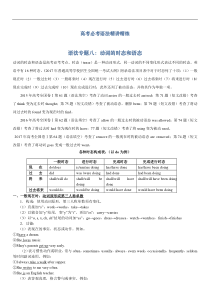 DOC
DOC
【文档说明】高考必考语法精讲精练专题八:动词的时态和语态 Word版含解析.doc,共(13)页,153.500 KB,由MTyang资料小铺上传
转载请保留链接:https://www.ichengzhen.cn/view-74811.html
以下为本文档部分文字说明:
高考必考语法精讲精练语法专题八:动词的时态和语态动词的时态和语态是高考必考考点。时态(tense)是一种动词形式,同一动词的不同变化形式表达不同的时态,英语中有16种时态。《2017年普通高等学校招生全国统一
考试大纲》附录语法项目表中对于时态列了十项:(1)一般现在时(2)一般过去时(3)一般将来时(4)现在进行时(5)过去进行时(6)过去将来时(7)将来进行时(8)现在完成时(9)过去完成时(10)现在完成进行时;此外还列了被动语态,并将其作为单独一项。2015年高考全国卷Ⅰ第61题(语法填空)考查
了动词arrive的一般过去时arrived;第71题(短文改错)考查了think变为过去时thought;第75题(短文改错)考查了被动语态,删掉been;第79题(短文改错)考查了将动词过去时的found变为现在时的find。2016年高考全国卷Ⅰ第62题(语法填空)考查了allow
的一般过去时的被动语态wasallowed;第74题(短文改错)考查了将过去时had变为现在时的have;77题(短文改错)考查了将using变为被动used。2017年高考全国卷Ⅰ第64题(语法填空)考查了remove的一般现在时的被动语态areremo
ved;第74题(短文改错)考查了将动词goes变成一般过去时went。各种时态构成表:(以do为例)一、一般现在时:动词原形或第三人称单数1.构成:使用动词原形,第三人称单数须有变化。(1)直接加“s”:work→works,take→take
s(2)以辅音加“y”结尾,变“y”为“i”,再加“es”:carry→carries(3)以“o,s,x,ch,sh”结尾的动词加“es”:go→goes,dress→dresses,watch→w
atches,finish→finishes2.功能:(1)表现在的事实、状态或动作。例如:①Ihaveadream.②Shelovesmusic.③Mary'sparentsgetupveryearly.(2)表习惯性动作或职业,常与ofte
n,sometimes,usually,always,everyweek,occasionally,frequently,seldom等时间副词连用。例如:①Ialwaystakeawalkaftersu
pper.②Shewritestomeveryoften.③SheisanEnglishteacher.(3)表客观真理,格言警句或事实。例如:一般时态进行时态完成时态完成进行时态现在do/doesis/am/aredoinghas/haved
onehas/havebeendoing过去didwas/weredoinghaddonehadbeendoing将来shall/willdoshall/willbedoingshall/willhavedoneshall/willhavebeendoing过去将
来woulddowouldbedoingwouldhavedonewouldhavebeendoing①Theearthmovesaroundthesun.②Thesunrisesintheeastandsetsinthewest.③Twoandtwomakesfour.④Nom
anbuterrs.(4)表示将来发生的动作:A.在由when,after,before,as,assoonas,although,because,if,evenif,incase,till,until,unless,aslongas,wh
ere,whatever,wherever等引导的状语从句中用一般现在时表将来发生的动作。例如:①I'lltellherwhenshecomestomorrow.②Evenifitrainsthisafternoon,I'llmeetyou.③What
everhappens,youshouldkeepcool-headed.④I'llberightherewaitingforyouwhereveryougo.B.按时间表将要发生的动作或事件,用一般现在时表达将来时概念。
例如:①Theplaybeginsat6:30thisevening.②Whendoestheplanetakeoff?③Heleavesforthatcitynextweek.④Accordingtothetimetable,thet
rainstartsat9o’clock.二.一般过去时:动词的过去式1.表示过去某个特定时间或某一段时间发生的动作或情况。例如:①Wevisitedtheschoollastspring.②Iwenttos
choolbybikewhenIwasinmiddleschool.③Chinawasfoundedin1949.2.在表示时间或条件等的状语从句中代替过去将来时。例如:①Shetoldmeshewould’tgowithusifitrainedthenextd
ay.②Theywouldnotleaveuntilshecameback.③Hisgirlfriendpromisedtomarryhimonceheboughtherabighouse.三.一般将来时:shall/will+动词原形1.表示将要发生的动作或存
在的状态。例如:①Hewillgraduatefromthecollegenextyear.②Weshallfinishourworkasquicklyaspossible.2.将来时的其它结构。例如:I.is/am/aregoingtodost
h.(美国口语中常读作begonna)①I'mgoingtobuyanewcarthisfall.②Heisgoingtosellhishouse.注意:begoingto与will的对比:下列情况须用will①Iwillbesixteenyearsol
dnextyear.②Itwillbethe20thofAugusttomorrow.③Whenhecomes,Iwillgivehimyourmessage.II.is/am/are+todosth.表示计划安排做某事或征求意见。例如:①AmItotakeoverhiswork?②
Wearetomeetatthegate.III.is/am/areabouttodosth.即将做某事。例如:①Thetalkisabouttobegin.四.一般过去将来时:would+动词原形1.表示过去某时之后将出现的情
况,通常用于宾语从句中。例如:①Hesaidthattheywouldmeetmeatthestation.②Shetoldmethatshewouldcometoseeme.2.表示过去习惯性动作(不管什么人称都用would)。例如:①Wheneverhehadtime,Tom
wouldgotoseehisgrandma.②Theoldcouplewouldgoforawalkaftersupper.注意句型:was/wereabouttodosth.when……正要做某事,这时……=was/wereonthepointofdoingsth.wh
en……(when引导的从句要用一般过去时)例如:①Hewasabouttogooutwhenthetelephonerang.②Iwasabouttogoshoppingwhenitrained.③Shewasonthepointofhavingsupperwhenthelightwentof
f.五.现在进行时:is/am/are+现在分词1.表示现在正在进行的动作。例如:①Thewaterisboiling.ShallImaketea?②Theworkersarebuildinganewbridgeacrosstheriver.2.表现阶段正
进行的动作。例如:①Heistakingphysicsthissemester.②Wearepreparingforourfinalexaminationthisweek.③Don'tyouthinkyoueattoomuch?You'reputtingo
nweight.3.go,come,leave,arrive,land,meet,die,start,return,join,etc.用于进行时态时表示即将开始的动作。例如:①Look!Thebusiscoming.②Theoldmanisseriouslyill,andheisdyi
ng.③AliceisleavingforShanghaiwithhermother.4.与always,forever,continually,constantly等副词连用,表示说话人带有感情色彩:赞赏或厌恶。例如
:①Heisalwaysthinkingofothers.②Theboyiscontinuallymakingnoises.③Theteacherisconstantlycriticizingherforbeinglate.六.过去进行时:was/were+现在分词1.表示过去某一时刻或阶
段正在发生的动作。例如:①Iwasplayingchessat8yesterdayevening.②WhenIarrived,theywerewatchingTV.③Theyweredoinghouseworkthistimelastweek.2.用于条件状语从句中表示过去将来进行的动作。例
如:①Shetoldmetowakehimupifshewassleeping.②IaskedmyfriendtowarnmeaboutitaslongasIwasdrivingtoofast.3.过去某时将发生的事。例如:①Th
eytoldmethattheywereleavingforNewYork.②HewasgoingoutwhenIarrived.七.将来进行时:shall/willbe+现在分词1.表示将来某个时刻正在进行的动作。例如:①Whatwilly
oubedoingthistimetomorrow?②Iwillbehavingdinnerthistimetomorrow.2.用将来进行时询问别人的计划、打算比用一般将来时更显礼貌。例如:①Willyoubehavingsupperwithusthisevening?②Wi
llyoubecomingtoseeustomorrow?3.将来进行时表示对即将发生的动作的推测。例如:①ShewillbearrivingatShanghaitomorrowmorning.②Thecarwillbegoingatthespeedo
f100milesanhour.八.现在完成时:have/has+过去分词1.表示过去所发生的动作对现在的影响或产生的结果。常与yet,just,before,recently,lately,ever,never等表时间的副词搭配使用。例如
:①Hehasn'tseenherlately.②Ihaven'tfinishedthebookyet.2.表示一个从过去某个时间开始,延续到现在并可能持续下去的动作,常与表示一段时间的时间状语连用。如:sofa
r(迄今为止),uptillnow(直到现在),foralongtime(很长时间),,inthepast/inthelastfewyears(在过去的几年里),thesedays(这些日子)。例如:①Hehasworkedherefor15years.②I
havestudiedEnglishsinceIcamehere.③TheforeignerhasbeenawayfromChinaforalongtime.④Sofar,Ihaven'treceiveda
singleletterfrommybrother.3.某些非延续性动词(即:动作开始便终止的动词),在现在完成时中不能与表示一段时间状语搭配。I.常见的非延续动词:die,arrive,join,leave,go
,refuse,fail,finish,buy,marry,divorce,awake,buy,borrow,lend等。II.这类动词并非不能用现在完成时,而是不能接常由for引导的时间状语。III.但若是用在否定句中,非延续动词的现在完成时可以与表示一段时间的状语连用。例
如:①Shehasgoneawayforamonth.(误)②Shehasbeenawayforamonth(正)①Themanhasdiedfortwoyears.(误)②Themanhasbeendeadfortwoyears.(正)①How
longhaveyouboughtthebook?(误)②Howlonghaveyouhadthebook.(正)4.几组对比:①HehasgonetoShanghai.他去上海了。②HehasbeentoShangh
ai.他去过上海。①Shehasgone.她已走了。②Sheisgone.她缺席了。(or她死了。)①Thedoorhasbeenclosed.门关上了。(动作)②Thedoorisclosed.门是关着的。(状态)九.过去完成时:had+过去分词1.表示过去某个动作或某个具体时间之前已经发生或完
成的动作,即“过去的过去”。例如:①TheyhadgoteverythingreadybeforeIcame.②TheplayhadbegunbeforeIgottothetheaterwithmyboyfriend.2.过去完成时常用于hardly/scarce
ly...when,nosooner...than(“一……就”)等固定句型结构中。例如:①Shehadhardly/scarcelygonetobedwhenthebellrang.=Hardly/Scarcelyhadsheg
onetobedwhenthebellrang.②Hehadnosoonerarrivedattherailwaystationthanhemetherparents.=Nosoonerhadhearrivedatthe
railwaystationthanhemetherparents.注意:hardly/scarcely/nosooner在句首时要用部分倒装。3.intend(打算),mean(打算),plan(计划)hope(希望),want(想要)等动词的过去完成时用来表
示“本打算/本计划/本希望/本想要做而没有”做的事。例如:①Ihadintendedtocallonyouyesterday,butsomeonecametoseemejustwhenIwasabouttoleave.
②Theyhadplannedtoholdafootballmatchlastweek,buttheyhadtocancelitbecauseofthebadweather.十.将来完成时:shall/willhave+过去分词。表示将来某时之前已经完成的动作。例如:①Theywil
lhavebeenherefor5yearsnextFriday.②Bytheendofthismonth,hewillhavefinishedthebook.十一.现在完成进行时:have/has+b
een+现在分词1.表示从过去某时开始一直持续到现在的动作,并且还将持续下去。例如:①Ihavebeenwaitingforanhourbutshehasn'tcome.②Hehasbeenrunningafterherfor8years.③Ihaveb
eenlearningEnglishsincesixyearsago.2.表示一个从过去开始延续到现在,可以包括现在在内的一个阶段内,重复发生的行动,例如:①Shehasbeenplayingtennissinceshewaseight.3.表
某种感情色彩。例如:①I'vebeenwantingtoseeyouforsomanyyears.②Who'sbeentellingyousuchnonsense.现在完成时与现在完成进行时对比:现在完成时强调“结果”,而现在完成进行时强调“动作的延续”。例如:①Ihavethoughto
fit.(我已想到了这一点。)②Ihavebeenthinkingofit.(我一直在想这一点。)①Jimhaspaintedthedoor.(杰姆已将门油漆过了。)②Jimhasbeenpaintingthedoor.(杰姆一直在油漆门。)注意:表示状态的动词不能用于现在完成进行时。例如
,我们可以说:Ihaveknownhimforyears.但是不能说:Ihavebeenknowinghimforyears.这类不能用于现在完成进行时的动词还有:love,like,hate等等。十二.过去完成进行时:hadbeen+现在
分词表示过去某个时间之前一直在进行的动作。例如:①ShesaidthatshehadbeentypingapaperbeforeIcamein.②Ihadbeenwaitingforhimbeforehearr
ived.十三.过去将来进行时:wouldbe+现在分词表示从过去某时看将来某个时侯正在进行的动作。例如:①HeaskedmewhatIwouldbedoingwhenhecamethenextday.②Hesaidthathewouldberea
dingthebookallmorningtomorrow.十四.过去将来完成时:wouldhave+过去分词表示从过去某个时间看将来某时之前动作已经完成。例如:①Hesaidthattheywouldhavearrivedbyseveno'clock.②Ithought
shewouldhavetoldyousomethingbythen.十五.将来完成进行时:shall/willhavebeen+现在分词表示某一动作从某时间开始一直延续到将来某一时间,是否继续下去由上下文决定。例如:①Bytheendofnextyear,wewillh
avebeendoingbusinesswitheachotherfor20years.②WeshallhavebeenstayinghereforfourweekswhenTomarrives.③Itwillha
vebeenrainingforaweekifitdoesnotstoptomorrow.十六.过去将来完成进行时:wouldhavebeen+现在分词表示从过去的某一时间开始一直延续到过去将来的某一时间。动作是否继续
进行,由上下文决定。例如:①HesaidthatbytheendofthespringtermhewouldhavebeenstudyingEnglishforthreeyears.②Shetoldmethatshewouldhavebeenteachinginthatun
iversityfor10yearsbythatsummer.被动语态一.被动语态的构成:被动语态由“be动词+及物动词的过去分词”构成,其中be动词本身没有意义,但有人称、单复数以及时态的变化。(不及物动词没有被动语态)常见各种时态对应的被动语态:(以do为
例)一般时态完成时态进行时态完成进行时态现在is/am/aredonehas/havebeendoneis/am/arebeingdone无过去was/weredonehadbeendonewas/were
beingdone无将来shall/willbedoneshall/willhavebeendone无无过去将来wouldbedonewouldhavebeendone无无二.含有情态动词的被动语态:由情态动词must/
can/could/may/might/should/would+bedone构成。例如:①Thetaskmustbefinishedbeforethisweekend.②Heshouldbepunishedbecausehetoldlies.③Thebookmaybetak
enawaybysomeone.三.被动语态的用法:1.不知道谁是动作的执行者,或没有必要指明谁是动作的执行者,被动语态中的介词短语bysb.通常省略。例如:①Thestreetsareswepteveryday.②Hiscarhasb
eenstolen.③Riceisgrowninmanycountries.④Thiskindofadvertisementcanbeseeneverywhere.2.带双宾语的及物动词变成被动语态有两种变法,指人的间接宾语用作被动语态的主语更常见。例如:①Hegaveherabeaut
ifulgiftyesterday.→Abeautifulgiftwasgiventoher(byhim).或者→Shewasgivenabeautifulgift(byhim).3.get+过去分词表被动,表示一种结果或状态。常见结构有:getkill
ed/cheated/burnt/wounded/paid/hurt/lost/married/caught.例如:①Hegotkilledinthetrafficaccidentlastweek.②Don’tgetcheatedbyherbeauty.③Hegotcaughtbyth
epolicebecauseheexceededthespeedlimit.4.havesthdone以及getsthdone(主要用于口语中)常常表示安排别人把事情做好或谈论意外的、不好的事情。例如:①Ineedtohavemyhaircut.②Yourwatchis
broken,you’dbettergetitrepaired.③Ifyoudon’tgetoutofmyhouse,Iwillhaveyouarrested.④Wehadourmoneystolenwhenwewereonholiday.⑤Joehadhislegbrokeninafight.
5.havesthtobedone表示主动提出请求帮助别人做某事。例如:①Iamgoingshopping,doyouhaveanythingtobebought?②Iintendtospendmyholidayinourhometown,doyouhaveanythingtobe
takentoyourparents?③Doyouhaveanythingtobetyped,sir?四.主动形式表被动意义:1.look,feel,taste,sound,smell,appear,seem,prove,turn,stay,become,fall,get,keep,g
row等系动词+形容词或名词构成系表结构。例如:①Theicefeelscold.②Hisplanprovedpractical.2.表示开始、结果、运动的动词,如begin,finish,start,open,close,stop,end,s
hut,run,move等。例如:①Workbeganat7'clockthismorning.②Theshopclosesat6p.meveryday.3.形容词easy,hard,fit,nice,dangerous,difficult等后面接动词不定式,且不定式和句中主
语构成逻辑上的动宾关系时,常用不定式的主动形式表示被动意义。例如:①Thiskindofwaterisfittodrink.②Thetextiseasytounderstand.4.某些动词如read,write,sell,wash,clean,lock,ope
n,dry等在表示主语的某种性质时,常用主动表被动。例如:①Theclotheswasheswell.②Yourpenwritessmoothly.5.其他的主动表被动的情况。例如:①Thebookisworthreadi
ng.②Mybikeneeds/wants/requiresrepairing.=Mybikeneeds/wants/requirestoberepaired.③Whoistoblame?高考英语短文改错及语法填空分析与训练·时态与语态考点规律分析
:动词时态考点主要涉及一般现在时与一般过去的区别,其命题方式通常是在一个一般现在时的背景下误用某个一般过去时;或者反过来,在一个一般过去时的背景下误用某个一般现在时。从所涉及的动词来看,主要涉及be和have两个常用动词。有时也涉及其他时态,如一般将来时,现在完成时等,但很少见。语法填空主要涉及
动词的时态及语态的变化。时态语态单句改错之真题训练:1.Weweredrivingalonganarrowroadwhenthecarstop…2.…andhadreturnedtothecar!Billisstandingatthesideof
thecar.3.TwomonthsagotheywerebackinAmerica.LastSunday,policecarshurrytothe…4.Today,itismucheasiertobehe
althythanitisinthepast.5.Also,scientistsanddoctorshadlearnedhowtodealwithmanydiseases.6.Anyonemayborrowbooks,anditcostnothingtoborrowthem.7.Ifthebo
okyouwillwantisout,youmayaskforittobecalledbackforyou.8.Ihadalwayswantedtoreturntothevillageaftermovingawayanditisreallygreattoseemos
tofmyoldfriendsagain.9.Theyofferedmecoffeeandotherdrinks.Wehaveagoodtimetalkingandlaughingtogether.10.Ilearnaboutyoufrom
myEnglishteacher,MissFang.11.Myfavouritesportisfootball.Iwasamemberofourschoolfootballteam.12.Iamhappyw
ithanyprogrammebuttheothersspentalotoftimearguingandtherewasnowayofsettlingthematterexceptbysellingtheset.1
3.I’dlikeverymuchtocomebutIhadanexaminationonMondaymorning.Itisavery…14.Irememberedherwordsandcalmdown.15.Theydidnotwantmetodoanyworkathome;the
ywantmetodevoteallmytimeto…16.Hesaidheisbusy.17.OnthewayupIwasbusytakingpicturessincethescenerywassobeau
tiful.Thetimepassesquickly.18.Buthisparentsthinkgoingtocollegeismoreimportantthanplayingsportsandcollegewastheonlyplaceforasmartboylikehisson.19
.AtonceIapologizeandcontrolledmyselfatmybesttillthedinnerstarted.20.Sometimes,wetalkedtoeachotherverywellinclass,butafterclasswebecomestran
geratonce.21.Shestoppedtolookoutofthewindowandfindacloudofsmokecomingoutofherneighbor’shouse.22.Wewerelivinginabigfam
ily.Wetreateachotherasbrothersandsisters.23.IamalwaysyoungwhenIwasstayingwiththem.24.Everydayhemakessurethatfreshvegetable
sandhighqualityoilareusingforcooking.25(2017·全国Ⅰ,73)....butonceIstartedthecar,mymindgoesblank.时态语态单句改错之模拟训练:1.JustnowJimtells
mehismotherwasill.2.Iphonetheotherstudentsamomentago.3.Weoftenplayedtogetherwhenwearechildren.4.Whatareyoudoin
gwhenIcalledyou?5.Iseeyouinthepark.Youweretalkingtoaprettygirl.6.Shedoesn’thearthedoorbell,forshewaswatchingTV.7.We’llstayathomeplayingca
rdsifitwillraintomorrow.8.Pleaseletmeknowifyouwillhaveanytrouble.9.Hehurthisbackwhenheisplayingfootballwithhisclassmates.10.I’llwritetohimw
henIfinishedthebook.11.Charlesworkedhardsinceleavingschool.12.Infact,IamverythinwhenIwasyoung.13.He’skindtome.Thoughheisverybusy,
hestillcametoseeme.14.Howlonghaveyoubeenhere?Howdidyoulikeourcity?15.Asisknowntousall,theearthturnedaroundthesun.16.I’minterestedinEng
lish,soIspokeitbetterthantheothersdo.17.Don’tworryaboutit.IpromiseyouIcometohelpyou.18.Noweverythingisdear.Evenas
mallpieceofbreadcostoneyuan.19.Remembertoturnoffthelightsbeforeyouwillleave.20.Iforgettotellhimthenews.Shallwetelephon
ehimnow?时态语态单句改错之提升训练:1.Hesaidthathewillseeyouoffattheairportthenextday.2.Whenhewillcomeback,I’llletyouknow.3.Hesaidthathehashadthebikefortwoy
ears.4.IworkonafarminNorthChinainthe1970s.5.Anewbridgewasbeingbuiltinourcityatpresent.6.Ifinishedmyhomeworkbe
foreIleftschool.7.IfeelregretfulnowthatIdon’tstudyhardwhenIwasinmyhighschool.8.IfIamyou,Iwoulddoit.9.Shebuysabikeyesterday.10.Icomehereintwod
ays.11.Idon’tthinkwemetbefore.12.Hetaughtheresincehecametothistown.13.ShesaidshewouldcallmebutIdidn’theardfromhersofar.14.IamtiredbecauseIha
dbeenworkingallday.15.Look!Herethebuscoming.16.Imeethiminothertime.17.Bythistimetomorrowwehavefinishedthework.18.SometimesIwillgetupat
eightinthemorning.19.Wehavetocancelthematchifitwillraintomorrow.20.Ididn’tseenmybestfriendfornearlytwoyears.时态语态单句语法填空之真题训练:1.(2016·全国Ⅰ,62)I_______
_______(allow)togetupclosetothesecuteanimalsatthe600-acrecentre.2.(2016·全国Ⅱ,43)Leavingthelessimportantthingsuntiltomorrow_
__________(be)oftenacceptable.3.(2016·全国Ⅲ,42)Sometimeschopsticksarequiteartistic.Trulyelegantchopsticksmight___________(make)ofgoldands
ilverwithChinesecharacters.4.(2016·全国Ⅲ,49)Confuciusbelievedkniveswouldremindpeopleofkillingsand_________
___(be)tooviolentforuseatthetable.5.(2016·北京,21)Jack___________(work)inthelabwhenthepowercutoccurred.6.(2016·北京,25)I____
_________(read)halfoftheEnglishnovel,andI’lltrytofinishitattheweekend.7.(2016·北京,30)Thestudentshavebeenworking
hardontheirlessonsandtheireffortswill_________(reward)successintheend.8.(2016·四川,阅读D)Nightmilkquickenedthestarto
fsleepand___________(cause)themicetosleeplonger.9.(2016·四川,61)Thegiantpanda____________(love)bypeoplethroughoutthew
orld.10.(2016·浙江,14)Whenthetimecametomakethefinaldecisionforacourse,Idecidedtoapplyfortheonethat__________
_(reflect)myinterest.11.(2017·全国Ⅰ,64)Whenfatandsalt________________(remove)fromfood,thefoodtastesasifism
issingsomething.学习札记:参考答案及解析时态语态单句改错之真题训练:1.stop改为stopped2.is改为was3.hurry改为hurried4.第二个is改为was5.had改为h
ave6.cost改为costs7.去掉will8.is改为was9.have改为had10.learn改为learned11.was改为is12.am改为was13.had改为have14.calm改为calmed15.di
d改为do16.is改为was17.passes改为passed18.was改为is19.apologize改为apologized20.talked改为talk21.find改为found22.treat改为treated23.am改为was
24.using改为used[beusedfor“被用来做”,为固定短语。]25.goes改为went时态语态单句改错之模拟训练:1.tell改为told,因句中有表过去的时间状语justnow(刚刚)。2.phone改为
phoned,因句中有表过去的时间状语amomentago。3.are改为were,因主句谓语为一般过去时。4.are改为were,因从句谓语为一般过去时。5.see改为saw,因下文用了weretalking。6.doesn’t改为didn’
t,因下文用了waswatching。7.去掉if从句中的will,因条件状语从句要用一般现在时表示将来意义。8.去掉will,因条件状语从句要用一般现在时表示将来意义。9.is改为was,因主句中的hur
t为一般过去时。10.finished改为finish,或在finished前加have。即在时间状语从句中要用一般现在时表示将来意义,但这里也可用现在完成时表示完成。11.worked前加has,句中的since表示“自从……以来一直……”,即表示从过去持续到现在的一段时间,故用现在完成时。
12.am改为was,根据从句中的一般过去时可知am应改为was。13.came改为comes,根据前面的两处一般现在时可知。14.did改为do,根据前面的现在完成时可知“你”现在还在我们城市,故后面一句问的是“你”现在对我们城市的看
法。15.turned改为turns。本句叙述的是客观真理,故用一般现在时。16.spoke改为speak。全句叙述的是现在的情况。17.come前加will,根据句意,此处应是将来时态。18.cost改为costs,句子讲述的是现在的一般情况。19.去掉will,时间状语从句要用一般现在时
表示将来意义。20.forget改为forgot,根据句意,此题的“忘记”应是指过去忘记。时态语态单句改错之提升训练:1.will改为would。宾语从句要用过去将来时态。2.willcome改为comes。时间状语从句用一般现在时表将来。3.has改为had。宾语从句需用过去完成时
。4.work改为worked。此句要用一般过去时态。5.was改为is。从atpresent可知,此句用现在进行时。6.finish前加had。离开学校是过去时态,在此之前完成就应用过去完成时。7.don’t改为didn’t。定语从句表示的是过去时态。此句要用一般
过去时。8.am改为were。此句为虚拟语气,要用过去时。9.buys改为bought。从yesterday可知,要用一般过去时。10.come改为willcome。从inthetwodays可知,谓语动词要用一般将来时。11.met前加have。Before是表示过去,应用现
在完成时态。12.taught改为hastaught。表示过去已经开始持续到现在,而且还可能继续下去的动作或状态,应用现在完成时态来表示。13.didn’t改为haven’t。sofar迄今为止,用于现在完成时态。14.had改为have。从am可看出是
现在时,其句中给出allday,应用现在完成进行时态。15.coming改为comes。Here,there放在句首构成倒装时,其时态只用于一般现在时或一般过去时。16.meet改为met。inothertimes从前,所以谓语动词要用一般过去时态。17.have前加sh
all。强调在将来某时刻为止时完成是某动作,应用将来完成时态。18.去掉will。Sometimes有时,暗示句子要用一般现在时。19.willrain改为rains。If引导的条件状语从句,要用一般现在时表将来。20.didn’t改为haven’t。Fornearlytwo
years暗示谓语动词要用现在完成时。时态语态单句语法填空之真题训练:1.wasallowed[根据语境及allowsbtodosth这一固定句式可知,我应该是被允许接近这些可爱的动物。]2.is[考查主谓一致和时态。本句的
主语为动名词短语leavingtheless...,动名词作主语谓语要用单数第三人称形式,且这里说的是一个客观事实,故要用is。]3.bemade[考查语态。根据句意筷子是被制造的。]4.were[考查时态。此处were是与w
ouldremind并列的谓语动词。]5.wasworking[考查时态。句意:杰克正在实验室里工作这时突然停电了。此题考查到句型bedoing...when...结构。由occurred可知停电是发生在过去的某一具体时刻,故用wasworking。]6.ha
veread[考查时态。句意:我已经读完这本英文小说的一半了,我会争取在周末读完。前一分句表示到现在已经完成的动作,与现在有联系,故用现在完成时。]7.berewarded[考查时态和语态。句意:学生们一直努力学习他们的功课,他们的努力终将得到成功的回报。由句意可知,reward这一动作发生
在havebeenworking之后,故用将来时态,reward和efforts之间为被动关系,所以用一般将来时的被动语态。]8.caused[考查时态,和前面的quickened并列关系。]9.isloved[全世界的人都喜欢大熊猫。这里用一般现在时表示现状,panda与love之间为被动关系
。]10.reflected[考查时态。句意:当最后决定选一门课程时,我决定申请那个反映兴趣的课程。主句用的一般过去时,从句也如此。]11.areremoved[考查被动语态。句意:当脂肪和盐从食物中被去掉。分析可知,fat、salt与remove之间是被动关系,而且是一般现在时]
 辽公网安备 21102102000191号
辽公网安备 21102102000191号
 营业执照
营业执照